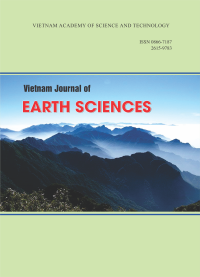Bioclimatic map of Tay Nguyen at scale 1:250,000 for setting up sustainable ecological economic models
Author affiliations
DOI:
https://doi.org/10.15625/0866-7187/36/4/6439Keywords:
Bioclimatic classification, bioclimatic criteria, vegetation ecology.Abstract
A study on development of a system for bioclimatic classification criteria and construction of a bioclimatic map of Tay Nguyen region at scale of 1/250,000 was conducted, based on statistical analysis of bioclimatic characteristics of Tay Nguyen, comparing with those of other regions of Vietnam. The system of classification criteria was developed based on 4 factors, namely: mean annual temperature (TN), total annual rainfall (RN), length of cold season (N) and length of dry season length (n). The thermal-humid indicators, featuring seasonal constraints (for tropical plants) as well as the thresholds for their division, were selected based on the ecological characteristics of vegetation and their role for the formulation, structure, appearance of the natural vegetation types of Tay Nguyen region. Results showed bioclimatic resources of Tay Nguyen territory is rich and diverse reflecting in 23 different bioclimatic units of a total of 57 separate polygons. That partly explains the diversity of vegetation types ofTay Nguyen. Study of bioclimatic classification has both a scientific and practical significance. Bioclimatic classification provides an important information for mapping ecological landscape of Tay Nguyen; A bioclimatic resource assessment of a specific territory is a necessary scientific basis for proposing the development orientation of economic sectors and establishment of sample sustainable economic models in Tay Nguyen territory.
References
Lam Cong Dinh, 1992: Bioclimatic applications in forestry in Vietnam. Science and Technology Publishing House, Hanoi.
Houérou, H.N., Popov, G.F., See, L., 1993: Agrobioclimatic Classification of Africa (Working paper) - FAO Agrometeorogy Series, N° 6. 227 pp.
Vu Tu Lap, 2002: Vietnam natural geography.Education Publishing House, Hanoi.
Legris, P., Blasco, F., 1989: Classification and mapping of vegetation types in tropical Asia (Reviewed by K.D. Singh) - FAO of the United Nations, Rome. 135 pp.
Nguyen DucNgu, 1988: Climate of Tay Nguyen. Monographs of 2ndTay Nguyen Program. Vietnam Academy of Science and Technology.
Thai Van Trung, 1978: Eco-genesis and classification of forest vegetation of Vietnam (From ecosystem perspective), Second edition, with correction, Science and Techniques
Publishing House, Ha Noi. 276 pp. (In Vietnamese, Resume in French, Summary in English, Russian and Spanish).
Nguyen Khanh Van, 1993: Bioclimatic Typology of Vietnam - Journal Izvestia, Geographical Series, Russian Academy of Sciences, Moscow (6) pp. 114-123 (in Russian: НгуенКханьВан1993:ТипологиябиослиматовВьетнама. Известия,СерияГеографическая, РоссийскаяАкадемияНаук, Москва).
Nguyen Khanh Van, 2006: Bioclimatic basis (Master curriculum), Hanoi Pedagogical University Publishing House of.
Nguyen Khanh Van, Nguyen ThiHien, 1999: The available methods of bioclimatic classification in Vietnam. Vietnam Journal of Earth Sciences No. 2, Academy of Science and Technology of Vietnam, Hanoi.






